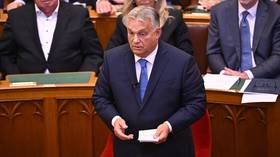Hungary looking to expand business in Russia
The EU country wants more cooperation in food and healthcare, Foreign Minister Peter Szijjarto says
Budapest will keep expanding cooperation with Russia despite sanctions pressure, Hungarian Foreign Minister Peter Szijjarto wrote in a Facebook post on Friday.
Szijjarto’s comments followed his meeting with Russian Health Minister Mikhail Murashko, who co-chaired the Russian-Hungarian Intergovernmental Commission, during the ‘Russian Energy Week’ forum in Moscow.
“Even in the current geopolitical circumstances, Hungary is striving to pursue cooperation with Russia on the basis of mutual respect, while pursuing its national interests,” the Hungarian foreign minister wrote. While the collective EU has been heaping restrictions on Moscow in connection with the situation in Ukraine, Budapest has taken a neutral stance on the conflict and has repeatedly and vocally criticized the bloc’s sanctions policy, arguing that it hurts the EU more than Russia.
In his post, Szijjarto wrote that Budapest is eager to increase the presence of its businesses in Russia, at least in sectors not targeted by restrictions.
“The agricultural and health sectors are not affected by the sanctions, so we will continue to support the expansion of Hungarian agricultural and food companies in the Russian market and we will also encourage the development of cooperation in the health sector.”
Szijjarto also reiterated the strategic importance of Hungarian-Russian cooperation in the energy sphere.
“The cold weather is coming and Hungarian homes need heating. And our energy security cannot be guaranteed without Russia,” he wrote.
According to Szijjarto, Hungary continues to buy Russian gas under a 15-year contract with state energy major Gazprom signed in 2021, which provides for the supply of 4.5 billion cubic meters of natural gas annually. He also noted that oil transit from Russia to Hungary via Ukraine is “running smoothly” and that Budapest “sincerely hopes that no one will jeopardize this supply route either financially, politically or physically.”
Since the start of the Ukraine conflict, the EU has banned imports of Russian seaborne oil and drastically reduced purchases of pipeline gas from Moscow, pledging to completely abandon Russian gas by 2027. Hungary, however, managed to secure an exemption from the bloc’s sanctions on Russian crude oil imports. The country also relies on Russia for 85% of its gas needs, and has a contract with Russia’s Rosatom to build new reactors for its Paks-2 nuclear power plant.
Addressing parliament last month, Hungarian Prime Minister Viktor Orban warned that rejecting Russian energy supplies would be harmful for EU countries, and devastating for Hungary.
For more stories on economy & finance visit RT’s business section






Comments are closed.